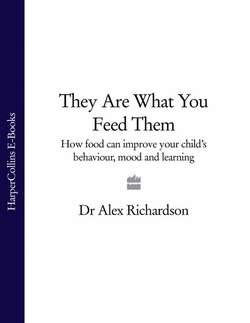Читать книгу They Are What You Feed Them: How Food Can Improve Your Child’s Behaviour, Mood and Learning - Dr Richardson Alex - Страница 47
What’s Beneath the Surface?
ОглавлениеYour child’s behaviour and performance at school (or in other things she does) are just the things you can see on the surface. These are often the main focus of programmes aimed at changing or influencing children’s behaviour and learning, some of which can be very helpful. But other powerful forces at work are often well hidden. What your child is thinking will affect her behaviour and performance. (If she thinks the teacher sees her as stupid or lazy, for example, she’ll be rather less likely to do what she’s told at school; or if she doesn’t understand why you won’t let her stay up late, this could lead to a tantrum.) What she’s thinking, though, is usually much harder to tell than what she’s doing. It’s beneath the surface.
You can help here by doing your best to develop a good relationship with your child. Talk to her and try to find out what she thinks. Even more important—listen to her without judging; so that she feels able to tell you what’s going on in her mind. With some children, this kind of communication can be hampered by their very difficulties—especially if these are with language, for example, or social interactions. Sometimes a professional with the right experience can help—but keep doing what you can, and always remember that your child’s thoughts and beliefs (based on whatever her perceptions and powers of reasoning are) will affect her behaviour and performance.
At the next level, your child’s feelings will colour her thinking. If she feels bad about herself, she’s more likely to develop negative thought patterns and beliefs, and this can prevent her from trying to learn how tackle her own problems. The same applies to you, of course. If you ever find yourself thinking ‘I’ve failed as a parent’ or ‘I really can’t deal with this’, it will be because your own feelings at that moment are negative ones. You may be feeling overwhelmed, but when those feelings pass, you’ll think differently. It’s the same with your child.
Underneath your feelings (the things you can recognize, identify or put a name to), there is another level at work—and that involves your emotions. We’re on the physical level here—because your raw emotions actually reflect the constant shifts and changes going on at the level of your bodily functions, including your heart rate, your breathing, your digestion, and even the workings of your immune system. These things are governed by your ‘autonomic nervous system’ (which works without your conscious intervention, and usually without even your conscious awareness). They do, however, have a very powerful effect on everything you think, feel and do. In fact, your emotions are literally what ‘move you’ or motivate you to do anything. Think of them as ‘e-motions’—reflecting physical (electrical and chemical) energy in motion.11
At the very foundations, then, your emotions are affected by your physiology. In other words, the state of your body affects the state of your mind—and vice versa, of course.
When you use your mind to choose to do something—like going for a walk, talking to a friend, eating something healthy, or hugging your child instead of shouting at him—your decision will affect what happens to you physically. The exercise and fresh air from going for a walk will affect your body chemistry positively (whereas slumping in front of the TV or drowning your sorrows with a drink will have different physical effects). Sharing your concerns with a friend, or showing your child you love him, can also help you (and them) to relax and feel better—so you think more positively, and as a result will probably perform better than you otherwise would. Either eating something healthy or consoling yourself with junk food will also affect your body chemistry—but rather differently in each case.
I hope you can see why nutrition is the real bedrock of this physiological level—because your body’s repertoire will be influenced by the chemical raw materials that it has available. And the same goes for your brain. This is why food and diet really are fundamental to your child’s development, both physically and in the way his mind works.
Your child’s behaviour (and the mind-body links that create it) can be likened to an iceberg: only one small part is showing, but a whole lot more is going on beneath.12
